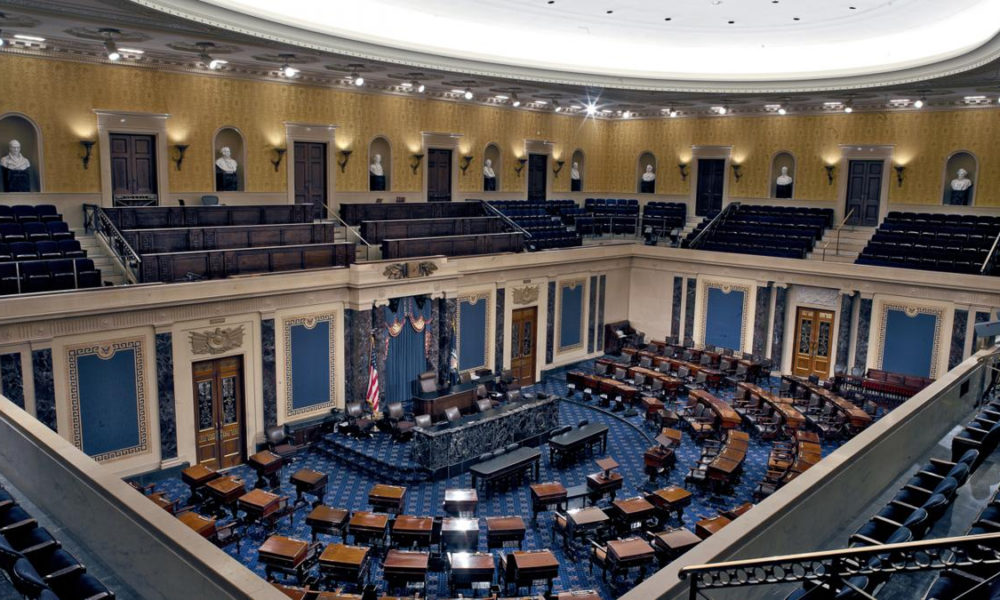The impeachment of Donald Trump has thrust a fateful choice upon the US Senate, which comes back into session this week. The eyes of the country and future historians are upon it; nothing less than the role of facts and the rule of law is at stake.
Some senators have proposed an abbreviated hearing, with no fact finding, in the hope of a swift vote against conviction. Others favor a genuine trial, which would include calling witnesses who have direct knowledge of the facts and issuing subpoenas for documents to acquire a full record of what transpired between the President and Ukraine.
Live witness testimony would almost certainly shed additional light on the question of whether Mr. Trump improperly pressured Ukraine to announce an investigation of his rival Joe Biden. For example, the Senate could hear testimony from John Bolton, the former national security advisor, who, according to his own attorney, participated in “many relevant meetings and conversations that have not been discussed” by any other witnesses. The senate could also hear from Mick Mulvaney, the acting chief of staff, who according to a recent NY Times report was integrally involved in delaying military aide to Ukraine, and who seemed to acknowledge that the hold-up was intended to pressure Ukraine to announce the investigation.
A unifying theme of this Presidency has been a relentless effort to suppress, distort or distract from facts that undermine either the president’s personal interests, his political agenda, or both. It started on the day the presidency began with exaggerations about crowds at the inauguration, continued with falsehood after falsehood about the dangers posed by immigration, and has culminated with the Orwellian claim that his phone call with Ukrainian President Zelensky was “perfect,” notwithstanding the plain language of the transcript (“I’d like you to do us a favor, though”).
This impeachment proceeding will test, more clearly than anything to date, whether the United States Senate is an accomplice in a post-truth presidency, in which “truth” comes to be redefined as whatever that president tweets it to be and whatever his political base accepts it to be, and exercise of constitutional oversight is deemed to be an illegitimate obstruction. If we cross that line now, one wonders how we will ever return.
This impeachment proceeding will also test the fortitude of the principle that no one is above the law, including the president. President Trump has ordered his top current and former aides to disobey lawful subpoenas issued by the House Intelligence Committee as part of its impeachment investigation. The President claims that his top aides have “absolute immunity” from testifying, despite the fact that every court that has examined such a claim has emphatically rejected it.
As one court stated just a few weeks ago when ruling that former White House counsel Don McGahn had to testify to Congress:
Stated simply, the primary takeaway from the past 250 years of recorded American history is that presidents are not kings. … This means that they do not have subjects, bound by loyalty or blood, whose destiny they are entitled to control. Rather, in this land of liberty, it is indisputable that current and former employees of the White House work for the People of the United States, and that they take an oath to protect and defend the Constitution of the United States….It is clear to this Court … that, with respect to senior-level presidential aides, absolute immunity from compelled congressional process simply does not exist.
If the Senate does not insist upon hearing witnesses testify, this president, and future ones, can simply thwart their own impeachment by ordering those with direct knowledge of their misdeeds to stay quiet. This effectively places the president above the law. According to Department of Justice official policy, a sitting president is not subject to criminal processes while in office, because impeachment is the only constitutionally prescribed remedy to remove a president from office. But, if a president who has been impeached by the House can deprive the Senate of the evidence it needs to determine whether the president has committed an impeachable offense, then the president can effectively shield himself from any accountability for his actions.
The sociologist Max Weber once wrote an essay on politics that I read in college. I’ve never forgotten this excerpt:
It is immensely moving when a mature person—no matter whether old or young in years—is aware of a responsibility for the consequences of conduct and really feels such responsibility with heart and soul. He/she then acts by following an ethic of responsibility and somewhere reaches the point where he/she says: ‘Here I stand; I can do no other.’ That is something genuinely human and moving. And every one of us who is not spiritually dead must realize the possibility of finding themselves at some time in that position.”
– Max Weber, Politics as a Vocation (edited for gender neutrality)
Senators, now this is the time to show this kind of moral courage.

